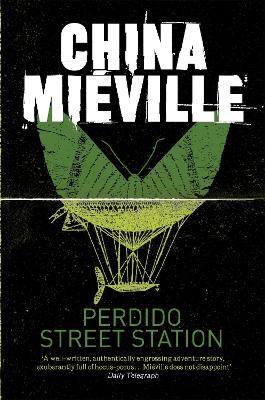Reviewed by empressbrooke on
The first thing that pops into mind about Perdido Street Station is that Miéville went overboard with the idea of, "Show, don't tell." Miéville shows everything down to the tiniest detail. This made it take a very long time to make it through all 600 pages, and I ended up spending much more time with this book than I ever envisioned. Which was fine, it was well-written, but at the same time I rather relieved to be done.
The plot was interesting; it starts off being about scientist Isaac trying to help a de-winged creature fly again. This turns into a horror story about brain-sucking giant moths after one of the specimen Isaac is studying escapes. Thrown in with it are some bits about a humanoid bug woman who is commissioned by a mob boss to make a sculpture of him, some political drama involving the militant government, and mechanical cleaning robots who gain intelligence. For the most part, everything ties together in the end, and all the different plots are relevant to each other. Except one: Lin the insect woman.
What was her purpose? She was a main character in the beginning, we saw many scenes from her point of view and learned about her life and her motivations, and then she just disappears and is presumed dead by Isaac for most of the book. What was the purpose of building her story so much before dropping her almost completely? It made no sense to me, especially when Isaac unexpectedly finds her in the end, tortured by the mob boss but alive, only to have her permanently lose her mind to the giant moths a couple pages later. She served no true purpose to the plot, she didn't motivate Isaac to do anything that he wasn't motivated to do otherwise - except maybe one thing, which ties into my other complaint:
In the final pages of the book, Isaac discovers that the de-winged creature he had been helping, Yagharek, had his wings removed as punishment for raping someone. In some ways, the scene played out well. He's conflicted, because Yagharek has become his friend who risked his life to kill the giant moths and save the city, but at the same time Isaac is repulsed by the crime. In real life, you hear a lot of people say that a rapist couldn't possibly have committed the crime, because he had done other things that were good, and he was someone's friend. Miéville, to my relief, understood that these good deeds don't cancel out or preclude someone from committing a terrible crime. However, Isaac seems to need Lin's torture to push him over the edge - in the abstract, it was horrible that his friend raped someone, but it took Isaac imagining how Lin got some of her injuries to make him abandon Yagharek. Which means that A) Isaac isn't empathetic enough to feel the same amount of outrage for the rape of someone he didn't know even after spending the entire book trying to save the city from creatures that were violating people, and B) Lin, despite being a rather strong and interesting character in the beginning who had her own storyline, was really nothing more than a female sacrificial lamb to motivate a decision Isaac made in the final pages. Which is a tired, tired trope.
Other parts of the end of the book were odd, too - Isaac and his companion, Derkhan, were feeling disgusted by their need to sacrifice a dying man to capture the moths; however, despite the multiple paragraphs describing their horror at their actions, they managed to kill members of the city's militia with no thought whatsoever. Also, a notorious serial killer who had been mentioned very briefly hundreds of pages prior for some reason shows up and helps them out. At first I thought we were going to discover that Lin had been Remade into this killer, but no, he just showed up, helped Isaac killed some militamen, and disappeared again without ever saying a word. Eh??
I'll wrap this up, as I realize it's not the sort of review I normally write. In a novel that was as well done as this one, the absolute pointlessness of the buildup, disappearance, and then sacrifice of Lin's character, as well as some random other problems, is really confusing.
Reading updates
- Started reading
- 10 December, 2009: Finished reading
- 10 December, 2009: Reviewed
